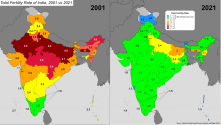I'm in China, and I don't currently see even a hint of any of these ideas being implemented. I can't even think of a Chinese TV show or movie in recent memory to feature a happy family with two or more children. The last one I can think of is 家有儿女 from nearly 20 years ago. Anti-natalist sentiment is also expressed freely on Chinese social media and I don't see any hint of a crackdown on it. In addition to anti-natalism, all kinds of other "制造焦虑" ideology surrounding marriage, family, and child-rearing are freely expressed in Chinese social media with thousands of upvotes and sympathetic replies, such as the idea that it's deeply cruel to the first child (especially if it's a daughter) to have more than one child or the idea that having two sons means a lifetime of financial woe and misery. In modern China, I feel like the anxieties around having children are rapidly evolving into something that people outside of East China can't even begin to comprehend. People are worried about stuff that wouldn't even enter the minds of Joe Blow from Wisconsin let alone Mohammed Ali from Egypt.For the sake of articulating a maximalist pro-natalist approach, it would require a combination of strong media influence, economic incentives for family cultivation and tax penalties on unpaired/unmarried people without kids, combating anti-natalist ideology, as well as examining other similar/related cultures with higher birth rates for policy consultation and development (in China's case Vietnam and North Korea). Basically one would need to approach things as if it were a Cold War style of prolonged socioeconomic and ideological conflict in a manner of speaking (hypothetically).
Ultimately what I'm getting at is that slowing down, let alone halting or reversing, decreasing birth rates is hard enough, as many governments around the world can attest to, but doing so in modern China presents uniquely difficult challenges that I don't think can be overcome in the near feature at all.

